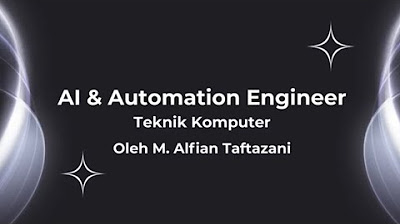Artificial Intelligence and the Environment | Scott Switzer | TEDxPaloAltoHighSchool
Summary
TLDRIn this TEDx talk, Scott Switzer, an electrical engineering student, explores the transformative role of artificial intelligence (AI) in addressing environmental challenges. He highlights innovative AI applications in protecting vital ecosystems like rainforests and coral reefs. From tracking endangered species using AI-powered cameras to predicting climate change effects and combating illegal logging and poaching, AI proves to be a powerful tool in conservation efforts. Switzer also presents his work on AI-driven fish identification for coral reef monitoring. He concludes by encouraging the audience to leverage their skills creatively to help preserve the environment through technological innovation.
Takeaways
- 😀 AI is a powerful tool for tackling environmental challenges like climate change and biodiversity loss.
- 🌍 Rainforests play a critical role in the planet's ecosystem, housing 80% of terrestrial species and providing resources for 1.6 billion people.
- 🌱 AI can help monitor and protect biodiversity in rainforests through animal tracking and data analysis.
- 🌡️ AI-powered systems, such as IBM's InfoSphere Stream, are being used to predict environmental disasters like droughts and wildfires.
- 🔊 Acoustic monitoring with AI can help detect illegal activities like poaching and logging in rainforests.
- 🐾 AI's ability to analyze camera footage for species identification provides researchers with faster and more accurate data on wildlife populations.
- 🧠 Machine learning enables AI systems to improve over time as they are exposed to new data, making them adaptive tools for solving complex problems.
- 🐠 Coral reefs, like rainforests, are crucial ecosystems, hosting 25% of marine life despite covering only 1% of the ocean floor.
- 🤿 Traditional reef surveys are prone to human error, but AI can enhance accuracy by automatically identifying fish species and their sizes.
- 💡 The use of AI in environmental conservation demonstrates the importance of creative problem-solving and innovation in addressing global environmental issues.
- 🌟 Switzer encourages individuals from all backgrounds to leverage their unique skills to contribute to environmental protection through innovative technologies like AI.
Q & A
What is artificial intelligence (AI) at its most fundamental level?
-Artificial intelligence is a program that can sense, reason, act, and adapt. It uses machine learning to improve over time by learning from data, making it dynamic and adaptable compared to traditional static coding.
How does AI differ from traditional programming?
-Traditional programming involves static execution based on predefined inputs and steps, whereas AI can adapt and improve over time by learning from new data, allowing it to handle more complex and dynamic problems.
Why are rainforests considered vital ecosystems?
-Rainforests cover about 80% of Earth's surface and are crucial as carbon sinks. They also harbor 80% of the world's terrestrial species and provide resources for 1.6 billion people.
What are some of the primary challenges facing rainforests today?
-Rainforests are threatened by illegal poaching, deforestation caused by illegal logging, and the impacts of climate change, all of which contribute to the degradation of these critical ecosystems.
How does AI help track animal species in rainforests?
-AI-powered cameras are set up in rainforests to capture video footage and identify the species of animals, achieving 85% accuracy. This helps monitor biodiversity and supports conservation efforts.
What role does IBM’s Infosphere Stream play in rainforest conservation?
-IBM's Infosphere Stream uses AI to monitor environmental factors such as carbon levels, soil moisture, humidity, and atmospheric pressure in rainforests. This data helps predict climate events like droughts and wildfires, potentially mitigating their impact.
What is acoustic monitoring and how does it assist in rainforest conservation?
-Acoustic monitoring involves using recycled cell phones to capture audio data in rainforests. AI analyzes the audio to distinguish between natural sounds and human activities, such as chainsaws or conversations, enabling faster response to illegal activities.
Why are coral reefs compared to rainforests in terms of biodiversity?
-Coral reefs, despite covering only 1% of the ocean floor, support 25% of marine life, making them as ecologically important as rainforests for biodiversity.
What are the challenges with traditional reef monitoring techniques?
-Traditional reef monitoring methods, such as scuba diving and manually recording fish species and sizes, are prone to human error, including estimating fish sizes and keeping track of which species have already been counted.
How does the 'Fish Sense' project improve coral reef research?
-The 'Fish Sense' project uses an AI-powered depth camera to identify fish species and measure their sizes underwater. This eliminates human error and increases the accuracy of reef biodiversity data, making research more efficient.
What is the main takeaway from Scott Switzer's TEDx talk?
-The key message is that AI can be a powerful tool in solving environmental issues. Switzer encourages everyone to leverage their skills creatively to contribute to environmental conservation and overcome traditional problem-solving limitations.
Outlines

Esta sección está disponible solo para usuarios con suscripción. Por favor, mejora tu plan para acceder a esta parte.
Mejorar ahoraMindmap

Esta sección está disponible solo para usuarios con suscripción. Por favor, mejora tu plan para acceder a esta parte.
Mejorar ahoraKeywords

Esta sección está disponible solo para usuarios con suscripción. Por favor, mejora tu plan para acceder a esta parte.
Mejorar ahoraHighlights

Esta sección está disponible solo para usuarios con suscripción. Por favor, mejora tu plan para acceder a esta parte.
Mejorar ahoraTranscripts

Esta sección está disponible solo para usuarios con suscripción. Por favor, mejora tu plan para acceder a esta parte.
Mejorar ahoraVer Más Videos Relacionados

Artificial intelligence in agriculture | DW Documentary

Unveiling the Pros and Cons of Artificial Intelligence | Jada Scott | TEDxYouth@JeffersonStreet

ME401 Group1 Application of Artificial Intelligence In Fatigue and Fracture

AI & Automation Engineer Teknik Komputer

Bagaimana Pembelajaran Adaptive dengan Artificial Intelligence

tech
5.0 / 5 (0 votes)
